Google any of the recent headline-making protests anywhere in the world and you’ll see images of many demonstrators waving their national flags proudly or in anger.
As political protests have gripped various countries around the world, anyone with a newsfeed would have seen the flags of Chile, France, Iran, Iraq, India, Lebanon, Peru, Sudan, to name but some, flying over a range of gatherings, many of them anti-government. And closer to home, who can forget the #ThisFlag anti-government protests of Zimbabwe in 2016/17, that ultimately contributed to the downfall of the Mugabe regime in late 2017?
And then there are the many flags being waved at political party events in the US, Germany (even at far-right rallies), the UK, and so on, where the participants and audiences are very often aggressively partisan and where those egging on the flag wavers express views that are oppositional to government activities and policies.
What I’m getting at is that wearing or waving the national flag at a demonstration or at a political rally is an established and accepted form of freedom of expression in many, if not most, societies. This is because a flag is a political symbol denoting a political construct or entity – a country, a state – and so wearing it or waving it at a rally, protest or a march is meant to express something about the state of that country or nation.
I’ve identified four main uses for national flags: Official (flags flying at government premises, offices or sponsored events); commercial (the flag emblazoned on commercial products); civil (the hanging or flying of a flag at home or at sporting or other social events); and political (the wearing and waving of flags at political rallies and demonstrations).
Which brings us to what’s happening in Namibia at the moment.
In November last year, as the electoral landscape was heating up ahead of the 27 November 2019 elections, information minister Stanley Simataa issued a public statement in which he implied that people wearing and waving the national flag at political rallies and campaign marches were doing so illegally. In the wake of the ministerial statement, a ‘directive’ was issued to not allow people wearing a national flag adorned costume or a flag into polling stations. And then in January 2020 this ‘directive’ was again emphasised in communication between cabinet secretary George Simataa and the safety and security ministry. In both instances the National Symbols of the Republic of Namibia Act (No.17 of 2018) was cited as the legal basis for issuing the ‘directive’.
The specific section of the law cited, states: “(6) A person may not, without the prior written approval of the President or a person designated by the President for such purpose, use or display a National Symbol or any depiction so closely resembling a National Symbol, in a manner likely to cause confusion in connection with any trade, business, profession or occupation or in connection with any mark or description applied by him or her or in relation to, goods made, produced or sold by such person.”
In effect the ‘directive’ amounts to policing the use of the national flag in civil and political settings, but the law clearly does not deal with the use and display of the national flag in such contexts. Legal opinion has it that if the ‘directive’ is legally challenged, the state would have a very hard time justifying its actions if the police or other security services were to harass or arrest anyone wearing or waving a national flag at a political rally or demonstration.
This is because many Namibians appear to have recognised that freedom of expression is on the line and that the ‘directive’ and the mis-citing of law are political moves by political appointees of a specific political party aimed at intimidating and discouraging the supporters of their political opponents. To anyone looking, it sounds and seems autocratic in tone and intent, and is indicative of a political establishment shocked by the reality of its declining power, control and influence. And let’s be clear, it smacks of unconstitutional conduct.
Enforcing this spurious ‘directive’ could spectacularly backfire on Namibian authorities and would be another sign of the country’s gradually deteriorating political climate.
This is not a statement in support of any political movement or candidate, but, ultimately, the current Namibian government needs to be reminded that it does not own the national flag … it belongs to Namibians.
- The author, Frederico Links, is an IPPR research associate whose recent research has included political finance, the fake news phenomenon, and cybersecurity.

